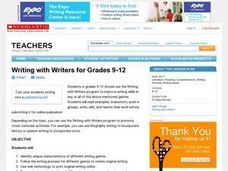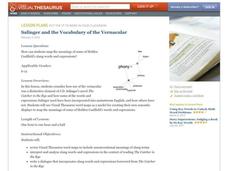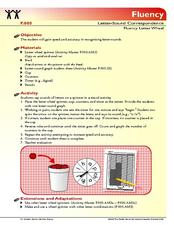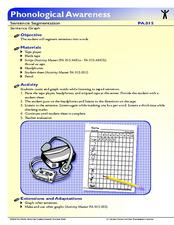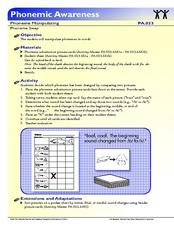Curated OER
Child Labor in Maryland: An Historical Investigation
Tenth graders, after reading two excerpts about contemporary child labor situations, discuss two broad questions in detail along with the industrial boom following the Civil War conditions in the United States. They investigate how the...
Curated OER
Writing with Writers for Grades 9-12
Have your class examine the characteristics of various writing genres using the Writing with Writers online project. Detailed instructions for how to introduce, discuss, and develop a piece of writing for each genre are included. Class...
Curated OER
Acting Like a Third Grader (Part 1)
Third graders, after brainstorming the positive and negative types of behaviors, become aware of the right and wrong way to behave as a third grader. They perform a skit that demonstrates the skills and behaviors used by third grade...
Curated OER
The Hope to Cope: Coping Skills
Explore how to weigh the value of positive and negative coping skills in life situations with middle schoolers. They will be able to recognize the coping skills that they have used that been negative ways of coping with stress and look...
Curated OER
Assessing Personal Plan of Study for Life-Long Learning
Twelfth graders examine and evaluate their personal education plans and discuss the importance of life-long learning. They discuss personal education plans and goals and reflect on their own plans, complete a Personal Plan of Study...
Curated OER
Star Spangled Banner: For Orchestra
Middle schoolers practice playing "The Star Spangled Banner" while focusing on phrasing. They work with the instructor to mark the lyrics and music, then play the song using the phrasing indicated. Several...
Curated OER
Chemistry Foundations
Extensive notes on foundational chemistry concepts make up this resource. It summarizes the properties of matter, the periodic table, chemical nomenclature, and general chemical bonding. Design a set reading comprehension questions to go...
Curated OER
Ratiocination
Writers use the four steps outlined here to edit their own or a peer’s paper. Using different colors of highlighters, editors note “to be” verbs, examine the length of sentences, box the first word in every sentence, and mark instances...
Curated OER
Salinger and the Vocabulary of the Vernacular
Writers explore vocabulary and expressions used in the English language. They use visual word maps to become aware of the different uses of words which will allow them to more readily interpret texts. Then they listen to/read excerpts...
Curated OER
Creating Children's Books
Students collaborate to create a children's book. In this visual arts lesson, student study the components and procedures that go into making a children's book including the shape, size. layout, biographical information about the author,...
Curated OER
Wild Horses of the Outer Banks
Students explore animal habitats. In this cross curriculum animal survival and writing lesson plan, students view a website about wild horses on Shackelford Island and discuss ways in which the horses have changed to this...
Curated OER
Is Perception Reality? Writing Paradoxes in Poetry
Explore the paradox of the universe - or, at least, of popular music - with this lesson. Using the songs "Inaudible Melodies" by Jack Johnson and "She" by Green Day, your class will complete a graphic organizer to help them understand...
Curated OER
So Much Depends Upon...Sixteen-Word Imagery Poems Inspired by Love that Dog by Sharon Creech
After reading Love That Dog by Sharon Creech (and possibly shedding a few tears), middle schoolers work on their own sixteen-word poems with a Six Trait writing activity. They focus on word choice in this activity to capture an...
K12 Reader
Describe It with Adjectives
Put children's descriptive writing skills to the test with these fun collaborative writing activities. Presented with the picture of an object, young writers are are tasked with creating a description that provides enough detail for...
Florida Center for Reading Research
Phonics: Letter Recognition, Venn Diagram Letter Name Sort
What’s in a name? Letters, of course! Partners place the letters of their names on a Venn diagram. Letters they have in common are named and placed in the overlapping area of the circles, while letters unique to just one of the names are...
Florida Center for Reading Research
Fluency: Letter-Sound Correspondence, Fluency Letter Wheel
Young scholars spin their way to letter sound fluency. While tomes, pairs spin a spinner and make the sound of the letter on which it lands. They add a counter to their cup for each sound they make correctly. At the end of the game,...
Florida Center for Reading Research
Fluency: Letter-Sound Correspondence, Letter Flash
Scholars work in pairs to drill and practice alphabet sounds, keeping track of their progress on a chart. Working one at a time, each partner flips letter cards, saying the sound and letter. If they get it correct, it goes in the YES...
Florida Center for Reading Research
Phonological Awareness: Sentence Segmentation, Sentence Graph
Young scholars segment sentences while they listen to a series of sentences. Using a graph, pupils make a mark for each word they hear. Learners listen to each sentence three times; once to listen, once to mark, and once to check their...
Florida Center for Reading Research
Phonological Awareness: Phoneme Blending, What's My Word?
At a listening station, learners listen to a pre-recorded script; they follow the directions and number each picture on their picture chart corresponding to the segmented phonemes they hear.
Florida Center for Reading Research
Phonological Awareness: Phoneme Isolating, Final Phoneme Find
This phonics activity engages listening skills and concentration. Young scholars listen to a teacher-made recording and use the provided worksheet to number the final phonemes they hear.
Florida Center for Reading Research
Phonological Awareness: Phoneme Matching, Sound Pie
Develop phonological awareness by challenging pupils to recognize final sounds in familiar words. Using magazines or other print resources, scholars search for pictures of words with the same final sound as a starter picture. Once they...
Curated OER
Phonological Awareness: Phoneme Manipulating, Name Changes
Set up a listening center, record the provided script, and see how well your class can manipulate phonemes based on the instructions you've provided. This center-based activity builds the phonological awareness and phoneme manipulation...
Florida Center for Reading Research
Phonological Awareness: Phoneme Manipulating, Phoneme Swap
Reading readiness can be a fun skill to foster. Scholars manipulate phonemes to change one word into another. They pick picture cards, say the object's name on the card, then change the final phoneme to create a new word. They then find...
Florida Center for Reading Research
Fluency: Connected Text, Repeated Timed Reading
There are many different ways to build accuracy and fluency when reading. This exercise employs repetition and timed drills to get the job done. Learners time each other as they read a passage, recording each other's time and accuracy.
Other popular searches
- Sentence Revisions
- Writing Revisions
- Polish English Revisions
- Making Revisions
- Short Story Revisions
- Punctuation Revisions
- Rainbow Revisions
- Revisions Methods
- Peer Revisions
- Making Revisions in Writing
- Writing Revisions Methods
- Rainboe Revisions



